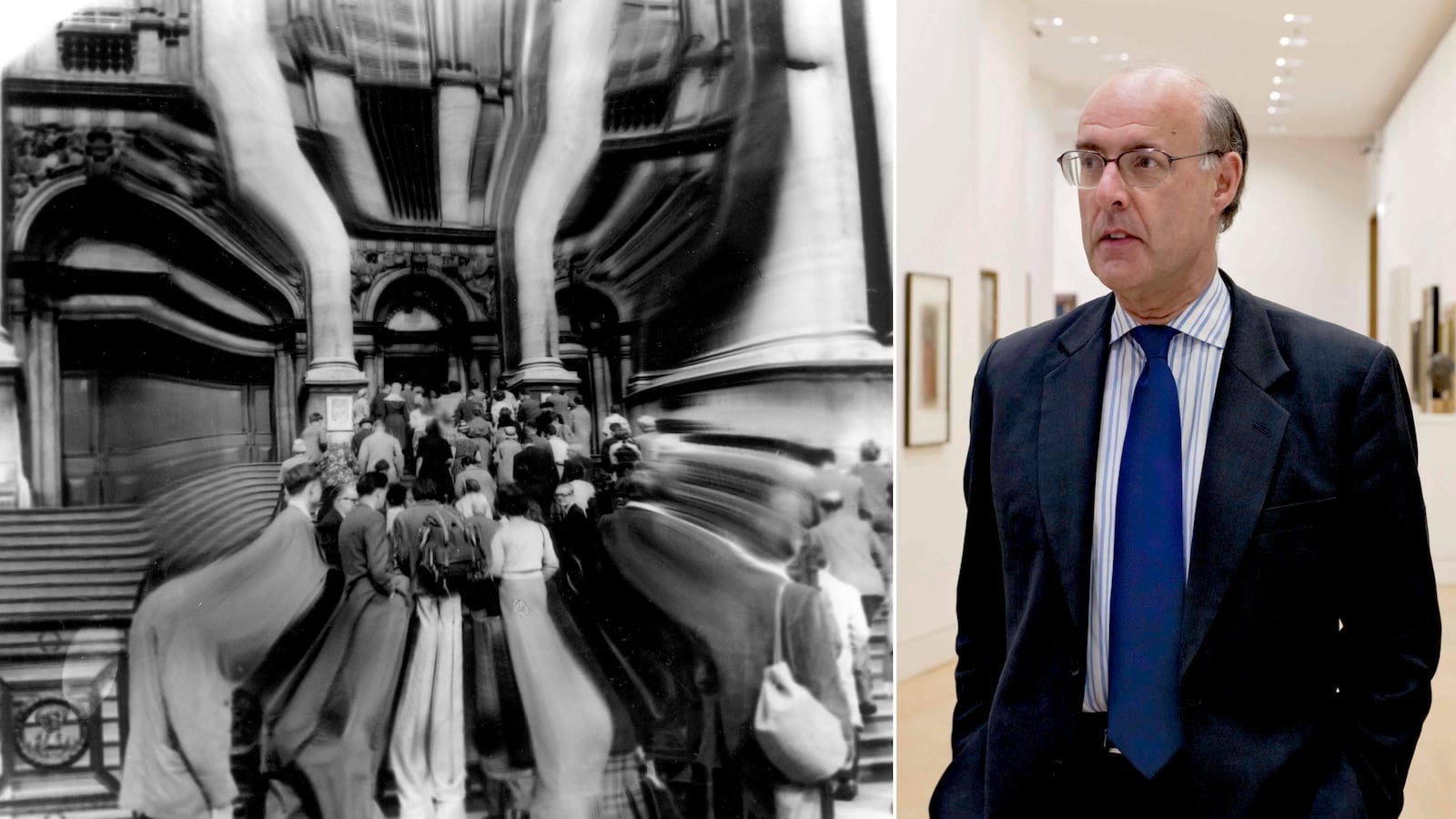Historians need conflict as poets need spring. Just a smattering of examples: Frederick J. Teggart, writing as the First World War came to an end, called civilization “the result of the stimulus evoked by the friction of one group upon another.” The same year, the declinist Oswald Spengler disagreed with Teggart that one group can stimulate another, but he was not against the fact that civilizations clash. “Between the souls of two cultures the screen is impenetrable,” he wrote in the best-selling Decline of the West. Edward Gibbon, the father of modern declinism, proposed that barbarians and Christians were the ones who tore down a crumbling, “effeminate” Roman Empire. Eric Hobsbawm’s history of the 20th century is titled The Age of Extremes. The attacks on Sept. 11 made Samuel P. Huntington’s The Clash of Civilizations famous. “We love freedom,” George W. Bush said in September of 2002. “They hate things.”

From what would seem like a divisive, Manichean, good-versus-evil world, another “decline and fall” book surfaced in 1990: The Decline and Fall of the British Aristocracy. What made the work float in its own bubble was that its author, then a relatively unknown British transplant teaching at Columbia University named David Cannadine, explained the destruction of the landed gentry without assigning blame to a perpetrator. The agents of their slide were many, and they operated offstage. The patricians also receded thanks to their own missteps. The Decline and Fall offered not an explanation of the world but an exceedingly complex story of how lions became unicorns, as the conclusion of The Decline and Fall flawlessly put it. The guardians of yesteryear had become parasites, Cannadine wrote.
But embedded inside the 700-page story was an implicit point that Cannadine wanted to make to historians: the world is not black-and-white, and we invoke the us-versus-them myth too often. “By definition, it is the task and the temptation of politicians (and journalists) to simplify both the present and the past,” he wrote in the preface to the 1999 edition. “But one responsibility of historians is to remind politicians (and journalists) that the past and the present are always more complex than they are professionally inclined to claim or believe.”
“This is a subject I’ve pondered for quite a long time—the whole notion of identities and how we are invited to see the world,” Cannadine, who is now a professor of history at Princeton University, told me. “I thought it was rather interesting to draw attention to these individuals, prophets, pundits, whatever they’ve been, who’ve said, ‘Human kind is above all determined by one single identity!’ And that’s built around whatever it might be. And it’s essentially an antagonistic one. Well, the world just isn’t that simple!”
Manichaeism doesn’t figure largely into the study of the aristocracy, but it has come to dominate American politics—especially in the post September 11th era. Cannadine’s new work, The Undivided Past: Humanity Beyond Our Differences, is really a book-length treatise that registers a historian’s recovery from the trauma of the “fatigue and fecklessness of global affairs” in the millennia past and, it seems, most especially from the last decade. Bush’s us-versus-them mentality was manifested in religious terms—biblical terms, in fact. “Gog and Magog are at work in the Middle East,” he once urged a bewildered French President Jacues Chirac to support the War in Iraq in a private call. “Biblical prophecies are being fulfilled. This confrontation is willed by God, who wants to use this conflict to erase His people’s enemies before a new age begins.” (Chirac asked his staff after, “Do any of you know what he is talking about?”)
Bush is only the most blatant of the recent violators who invoke Christ in order to conquer. “The imperatives of a shared religious identity,” as Cannadine puts it, is simply an excuse, “a proxy for alternative and more compelling considerations such as dynastic ambition, national rivalry, economic competition, territorial acquisitiveness.” Humans have often ignored our shared humanity to mobilize against each other, and religious affiliation is only one of the categorical appeals. Cannadine lines up five more, devoting a chapter each to them: national allegiance, class conflict, gender wars, racial animosity, and appeals to civilization.
“There are different occasions when protagonists, who believe in each of these identities, say this is much more important than all the others,” Cannadine tells me, with his level of indignation against the likes of Karl Marx, Eric Hobsbawm, and E.P. Thompson rising along with his animated voice. “Well, they can’t all be right!” And he’s not sure if any of them are right. To some, today’s world looks to be defined by the clash between Christian democracies and Islamic fundamentalists—that is the problem at hand, and that ought to be our focus. Cannadine is contemptuous of this view. Always composed, as a British lord must be (he was knighted by the Queen on New Year’s Eve in 2008), he is nevertheless tired of the abuse of history he’s seen, and passionate about the mission that he’s at last discovered. And as a historian, his disdain is ringed with knowledge of the past—that Christians did not always war with Muslims. To treat Islam as one evil enterprise “seems to me to be the height of inaccuracy and irresponsibility,” he told me forcefully. Even Edward Gibbon was more nuanced than that. Early Christians, Gibbon wrote, had such “intestine dissentions” that they “inflicted far greater severities on each other, than they have experienced from the zeal of infidels.” Sometimes the minor differences within one religion are bigger than the boundaries between two faiths. For most of their history, Christians and Muslims have got on reasonably well.
As for the divisions between nation-states, Cannadine urges us not to forget that many of them were created out of the wreckages of former empires, with random groups lumped together. The Italian statesman Massimo d’Azeglio wrote in his memoirs, “We have made Italy. Now we have to make Italians.” King Faisal, who built Iraq, said there were no Iraqi people, just “unimaginable masses of human beings.” “Nigeria is not a nation,” Nigeria’s founding nationalist Jeremiah Obafemi Awolowo said. “It is a mere geographical expression.” Most fervent nationalist rage looks foolish in retrospect—the houses of national identities have been built on arbitrary borders. Anyway, international boundaries are being erased if not by air travel then certainly by cyber connectivity. Nations have been able to coexist peacefully, and as the evolutionary biologist Steven Pinker argues in The Better Angels of Our Nature: Why Violence Has Declined, we are living in the most peaceful period in history, amid a Pax Humana. Peace is to historians “what good news is to journalists,” Cannadine writes. “The default mode.” It doesn’t get reported. Even historians are suckers for sensationalism.
In his efforts to foster a more nuanced view of the world, Cannadine has aligned himself with two other figures, both of whom happen to be, like him, at Princeton: the philosopher Kwame Anthony Appiah, who champions cosmopolitanism, which he defines as “universality plus difference”; and the historian Daniel T. Rodgers, whose 2011 book The Age of Fracture looks at the breakdown in recent times of many categories of identities. But Cannadine goes even further than Appiah and Rodgers, and he is at risk of being ostracized for his refusal to stand with the revolutionaries, because the act of choosing sides is precisely what’s wrong—even if you choose the “right” side.
This makes Cannadine something of an outsider, and The Undivided Past has been the subject of denunciations and ridicule. “The only solidarity that is acceptable is solidarity with humankind,” one academic colleague wrote. “If only the Taliban were like us,” quipped another. Cannadine is being made out to be something of a naïve hippie who wants everyone to just get along. Some have accused him of being out of touch with his discipline, of not showing what his ideal historical approach will look like, and of critiquing without providing a solution.
One might ask: how do you urge the Poles not to appeal to nationalism when the Nazis march into their borders? How do peaceful, non-antagonistic peoples prevent certain individuals from ratcheting up rage and creating divisive groups? What happens when menaces to societies don’t play by the rules, or when billionaires continue to get richer at the expense of the poor? Do you say to the unemployed: focus on our shared humanity?
In a word, yes. To Cannadine, the process of mobilizing is morally neutral: plenty of good causes have been achieved by it, and plenty of bad, as well. “I’m not suggesting they shouldn’t mobilize,” Cannadine says. “The claims that are made when they mobilize need to be less inflated.” There’s not much work for historians to do if they can’t paint some broad strokes and name a group or two, so it’s understandable that fellow academics are a little nervous. But all Cannadine asks for is more accurate group identities, less polarization, and increased dialogue—not for the suspension of all identification. One of the most important tasks of a historian is to unite humanity with the power of knowledge, not to sow artificial discord. People have worked out their differences before. They will do so again.





